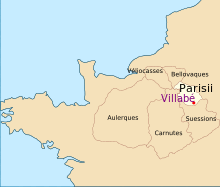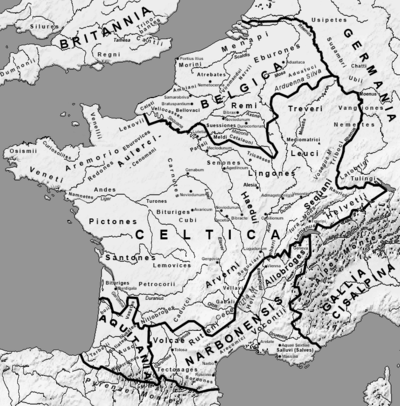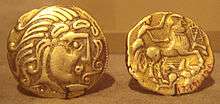Parisii (Gaul)
The Parisii were a Gaulish tribe[1], dwelling on the banks of the river Seine during the Iron Age, from the middle of the 3rd century BC until the Roman era.




Name
They are mentioned as Parisii by Caesar (mid-1st c. BC),[2] as Parísioi (Παρίσιοι) by Strabo (early 1st c. AD) and Ptolemy (2nd c. AD),[3][4] as Parisi by Pliny (1st c. AD),[5] and as Parisius and Parisios in the Notitia Dignitatum (5th c. AD).[6][7]
The meaning of the Gaulish name 'Parisii' is debated.[8][9] According to Delamarre (2003), it may derive from the root pario- ('cauldron').[8] Holder (1904) interpreted 'Parisii' as 'the makers' or 'the commanders', by comparing the name to the Welsh peryff ('lord, commander'), from paraf - peri ('to make, to produce, to command to be done').[9] Another tribe name Parisi is also mentioned in Britain.[8]
The city of Paris, attested as Civitas Parisiorum ca. 400 AD ('Civitas of the Parisii') is named after the Gallic tribe.[7]
History
The Parisii colonized their chief city (or oppidum) about 250 BC, as first mentioned in Julius Caesar's Commentarii de Bello Gallico.[10]
According to the Commentarii de Bello Gallico, when the Romans under Caesar entered this territory, the Parisii started burning down their own towns for they were willing to give up these possessions rather than have them taken by the Romans.[11]
In 52 BC, in concert with the Suessiones, the Parisii participated in the general rising of Vercingetorix against Julius Caesar. Before the Roman period, the Parisii had their own gold coinage.[11]
Once part of the Roman Empire the Parisii oppidum later became the site of Lutetia, an important city in the Roman province of Gallia Lugdunensis, and ultimately the modern city of Paris, whose name is derived from the name of the tribe. An ancient trade route between Germania and Hispania existed at the area, by way of the meeting of the Oise and Marne rivers with the Seine.[12][13]
See also
- Iron Age of North Europe
- List of peoples of Gaul
- Paris
- Parisi (Yorkshire), tribe of similar name in East Yorkshire, UK
References
- Caesar. Commentarii de Bello Gallico
- Caesar. Commentarii de Bello Gallico, 4:3
- Strabo. Geōgraphiká, 4:3:5
- Ptolemy. Geōgraphikḕ Hyphḗgēsis, 2:8:10
- Pliny. Naturalis Historia, 4:107
- Notitia Dignitatum. oc 42, 23, 66
- Falileyev 2010, p. entry 2254.
- Delamarre 2003, p. 247.
- Busse 2006, p. 199.
- E. Planta - A new picture of Paris; or, The stranger's guide to the French metropolis Samuel Leigh & Baldwin & Cradock 1831 (16th edition). Retrieved on 2017-04-23 from https://books.google.fr/books?id=jGMDAAAAQAAJ&pg=PA111&dq=Parisii,+Paris&hl=en&sa=X&ved=0ahUKEwjv2rCA1LrTAhWGvBoKHWxOBRA4FBDoAQhRMAc#v=onepage&q=Parisii%2C%20Paris&f=false (1st return).
- "Paris". Encyclopædia Britannica Ultimate Reference Suite. Chicago: Encyclopædia Britannica. 2014.
- Andrew Ayers - The Architecture of Paris: An Architectural Guide Edition Axel Menges, 2004 ISBN 393069896X Retrieved 23 April 2017
- H. Sauval - Histoire et recherches des antiquités de la ville de Paris, Volume 1 chés C. Moette, 1724 > 1st return Retrieved 23 April 2017
Bibliography
- Busse, Peter E. (2006). "Belgae". In Koch, John T. (ed.). Celtic Culture: A Historical Encyclopedia. ABC-CLIO. pp. 195–200. ISBN 978-1-85109-440-0.
- Delamarre, Xavier (2003). Dictionnaire de la langue gauloise: Une approche linguistique du vieux-celtique continental (in French). Errance. ISBN 9782877723695.
- Falileyev, Alexander (2010). Dictionary of Continental Celtic Place-names: A Celtic Companion to the Barrington Atlas of the Greek and Roman World. CMCS. ISBN 978-0955718236.
External links

